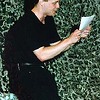Kenneth Goldsmith
Autor de Uncreative Writing: Managing Language in the Digital Age
Sobre El Autor
Kenneth Goldsmith teaches writing at the University of Pennsylvania and is the founder of UbuWeb. His books include Uncreative Writing: Managing Language in the Digital Age (Columbia, 2011) and Wasting Time on the Internet (2016).
Obras de Kenneth Goldsmith
Obras relacionadas
Verso 2015 Mixtape — Contribuidor — 2 copias
Etiquetado
Conocimiento común
- Fecha de nacimiento
- 1961
- Género
- male
- Nacionalidad
- USA
- Lugar de nacimiento
- Freeport, New York
- Ocupaciones
- poet
critic - Relaciones
- Donegan, Cheryl (spouse)
Miembros
Reseñas
También Puede Gustarte
Autores relacionados
Estadísticas
- Obras
- 29
- También por
- 3
- Miembros
- 617
- Popularidad
- #40,747
- Valoración
- 3.4
- Reseñas
- 9
- ISBNs
- 47
- Idiomas
- 5
- Favorito
- 2













As idealist as one would like to be, there are many points here to keep in mind. Towards the end of the book, Christian Bök's words on his Xenotext experiment and the transhumanist necessity of considering the perpetuation of poetry through considering non-human readership. Or, in other words, "if poetry already lacks any meaningful readership among our own anthropoid population, what have we to lose by writing poetry for a robotic culture that must inevitably succeed our own? If we want to commit an act of poetic innovation in an era of formal exhaustion, we may have to consider this heretofore unimagined, but nevertheless prohibited, option: writing poetry for inhuman readers, who do not yet exist, because such aliens, clones, or robots have not yet evolved to read it."
Considering the reading skills (and especially reading expectations) of many people nowadays or, more likely, at any given time, it sounds like complex writing such as that of Joyce or of Bök himself will be definitely more popular among the non-human population. But for every RACTER story (of arguable success) there is a Tay story (of unintended effects...). So there you go...… (más)